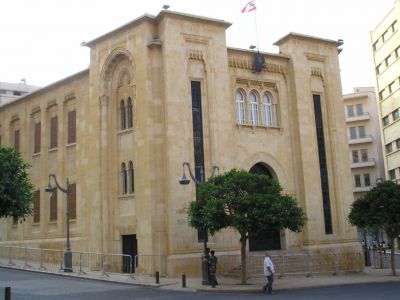
Lebanese Parliament, Beirut
The Lebanese Parliament, located in Beirut, serves as the national legislature of the Republic of Lebanon. This bicameral body consists of 128 members, elected for four-year terms across multi-member constituencies. Reflecting Lebanon's religious diversity, the seats are evenly split between Christian and Muslim denominations as mandated by Constitutional Article 24. Lebanon practices universal adult suffrage, empowering all adults to vote in elections.
The Parliament's primary roles include electing the President of the Republic, approving the government, and legislating laws and budgets. The Prime Minister and Cabinet, although appointed by the President, must maintain the confidence of a majority in the Parliament to govern.
The Parliament Building, a historic structure, was designed by Mardiros Altounian and completed in 1934 during the French Mandate. Altounian, inspired by Lebanese traditions and Oriental styles from major cities like Paris, Istanbul, and Cairo, created a design that integrates Beaux-Arts elements with local architectural features. This includes twin and triple arch windows and a limestone façade adorned with arched openings and stalactites. A significant architectural feature of the building is the reinforced concrete frame supporting a 20-meter diameter cupola over the chamber of deputies, showcasing advanced construction techniques of that era.
The Parliament's primary roles include electing the President of the Republic, approving the government, and legislating laws and budgets. The Prime Minister and Cabinet, although appointed by the President, must maintain the confidence of a majority in the Parliament to govern.
The Parliament Building, a historic structure, was designed by Mardiros Altounian and completed in 1934 during the French Mandate. Altounian, inspired by Lebanese traditions and Oriental styles from major cities like Paris, Istanbul, and Cairo, created a design that integrates Beaux-Arts elements with local architectural features. This includes twin and triple arch windows and a limestone façade adorned with arched openings and stalactites. A significant architectural feature of the building is the reinforced concrete frame supporting a 20-meter diameter cupola over the chamber of deputies, showcasing advanced construction techniques of that era.
Want to visit this sight? Check out these Self-Guided Walking Tours in Beirut. Alternatively, you can download the mobile app "GPSmyCity: Walks in 1K+ Cities" from Apple App Store or Google Play Store. The app turns your mobile device to a personal tour guide and it works offline, so no data plan is needed when traveling abroad.
Lebanese Parliament on Map






Sight Name: Lebanese Parliament
Sight Location: Beirut, Lebanon (See walking tours in Beirut)
Sight Type: Attraction/Landmark
Sight Location: Beirut, Lebanon (See walking tours in Beirut)
Sight Type: Attraction/Landmark
Walking Tours in Beirut, Lebanon
Create Your Own Walk in Beirut
Creating your own self-guided walk in Beirut is easy and fun. Choose the city attractions that you want to see and a walk route map will be created just for you. You can even set your hotel as the start point of the walk.
Beirut Introduction Walking Tour
How many times can a city die? Beirut, in 5,000 years, has died and come back many times. Archeological digs downtown have revealed Phoenician, Greek, Roman, Byzantine, Arab, Crusader and Ottoman remains and signs of influence.
In 140 BC the city was destroyed by Diodotus Tryphon, a king of the Seleucid Empire. His Hellenistic city lies over the Phoenician one. Pompey the Great arrived in 64 BC... view more
Tour Duration: 2 Hour(s)
Travel Distance: 3.3 Km or 2.1 Miles
In 140 BC the city was destroyed by Diodotus Tryphon, a king of the Seleucid Empire. His Hellenistic city lies over the Phoenician one. Pompey the Great arrived in 64 BC... view more
Tour Duration: 2 Hour(s)
Travel Distance: 3.3 Km or 2.1 Miles
Seaside Walking Tour
If you wish to unwind or, perhaps, seek some quality time with your family and friends in a completely safe environment, while in Beirut, the local seaside area offers ample opportunities for both. Lined with palm trees, the city's waterfront guarantees a truly joyful experience and is as much fun for watching the Mediterranean, beautiful people and breathing the air as it is for exploring... view more
Tour Duration: 2 Hour(s)
Travel Distance: 3.2 Km or 2 Miles
Tour Duration: 2 Hour(s)
Travel Distance: 3.2 Km or 2 Miles


